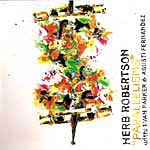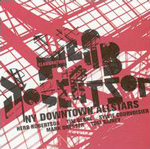Home » Jazz Articles » Profile » Herb Robertson: Abandon in the Moment
Herb Robertson: Abandon in the Moment
What attracted me to the music was the selflessness about it and the idea that it's a democratic process where everybody is equal in participation
 Amid a whorl of scraped cello, tenor sax squawks, and bass clarinet blats, trumpeter Herb Robertson paused, his eyes closed in concentration. With NSA-like hearing ability, he pierced the action with a bracing note that crystallized the unfurling improvisation. The intent listening and bold responses displayed during saxophonist Lotte Anker's January show at The Stone typify Robertson's commitment to playing in the moment.
Amid a whorl of scraped cello, tenor sax squawks, and bass clarinet blats, trumpeter Herb Robertson paused, his eyes closed in concentration. With NSA-like hearing ability, he pierced the action with a bracing note that crystallized the unfurling improvisation. The intent listening and bold responses displayed during saxophonist Lotte Anker's January show at The Stone typify Robertson's commitment to playing in the moment.
"Once I start improvising I just can't think about other things," Robertson says. "Improvisation, to me, that's what exists: when I'm improvising, it's music." Forging a distinct sound, he combines the chops and projection of a big band lead trumpet with the imagination and fearlessness of an improviser, extending his textural range with ambitious use of multiple mutes, vocalizations, megaphones, and whistles.
Since the early '80s, he's been a fixture of the Downtown scene as a sideman to saxophonist Tim Berne and bassist Mark Helias and as a leader. Internationally, he's held tenures in bassist Barry Guy's New Orchestra, pianist Satoko Fujii's Orchestra West, and guitarist Pierre Dorge's New Jungle Orchestra and maintains associations with saxophonists Evan Parker and Frank Gratkowski.
"I don't like to repeat myself, ever," Robertson says. "I always try to come up with something new." In March, 2009 he showcased his range in Gerry Hemingway's Quartet, the Fonda-Stevens Group, and a rare duo with longtime collaborator Berne. Later this year he'll appear at the Copenhagen Jazz Festival.
Raised in New Jersey, Robertson began playing in the fifth grade and was about 16 when he decided to pursue jazz, "the ultimate expression of trumpet."
Particularly attracted to Freddie Hubbard's sound, Robertson spent hours absorbing and playing music, often bringing dinner to the practice room. "It was like one of my favorite things of the day, was to practice the trumpet," he recalls. He still keeps a disciplined daily practice schedule to maintain his dexterity, range, and stamina and to work on chromatic and intervallic exercises.
Robertson attended Boston's Berklee College of Music as a performance major, and played up to 30 hours a week in small combos and big bands, with visions of being lead trumpet in Buddy Rich's band. But he soon realized the regimentation of big bands was not for him. After graduating in '73, he went on the road with an amplified Canadian jazz-rock band. Not exactly a shrinking violet, Robertson struggled to hear himself in the group and strained to get louder. The months of exertion took a toll and he completely blew out his chops.
Unsure whether he'd play trumpet again, Robertson was frustrated and spent roughly three years rebuilding. During this time he discovered modern classical and electronic music, feeling a connection to its atonality. This led toward freer music and exploring ways to cloak the trumpet's sound. Experimenting with warbling mutes and whispered and shouted vocalizations, he tried to blend in with groups instead of blaring above. In New York near the end of the '70s, he met like-minded musicians searching for new sounds and strategies to improvise.
"What attracted me to the music was the selflessness about it and the idea that it's a democratic process where everybody is equal in participation," he says. "I think that was the main change of the music in the early '80s: it wasn't the individual, it was more of the collective that really evolved."
Throughout the '80s, he garnered a reputation as an adventurous, uncompromising improviser sparring in Berne's groups, leading his own, and playing with a slew of others. With a string of recordings for JMT, including X-Cerpts (Live at Willisau) (1987) and Shades of Bud (1988), his brass and drums tribute to pianist Bud Powell, Robertson exhibited a breadth of stylistic influences and, like his cohorts, sought to blur the line between composition and improvisation.
 "When you hit the high moments it's the real thing and you're really surprised by it, and that's what makes it interesting," Berne says. "And Herb just epitomizes that as far as I'm concerned." Though they don't play together as often anymore, the two converge every few years to reestablish their rapport and advance the music by incorporating new influences and experiences.
"When you hit the high moments it's the real thing and you're really surprised by it, and that's what makes it interesting," Berne says. "And Herb just epitomizes that as far as I'm concerned." Though they don't play together as often anymore, the two converge every few years to reestablish their rapport and advance the music by incorporating new influences and experiences.
Throughout the '90s, Robertson performed on a series of recordings for the Cadence and CIMP labels, including co-led groups with drummer Phillip Haynes, sessions with Lou Grassi's Po'Band, and various meetings with bassist Dominic Duval. "There's a purity to Herb and his approach to music that's hard to describe, but you know it when you play with him," says drummer Jay Rosen, who played in Robertson's trio with Duval and matched him with trumpeter Paul Smoker for his own Drums 'n Bugles (CIMP, 2001).
Robertson frequently works in Europe with European musicians, and even moved to Berlin for about three years to close the millennium. Playing with and learning the sounds of different musicians pushed Robertson's composing and performing in a free direction. "Now I'm more into the horn and I'm not writing as much: it's not written composition, it's more playing composition," he says.
Robertson's "Sick(s) Fragments" is six short sketches written to provoke the improvisation of his NY Downtown Allstars on Real Aberration (Clean Feed, 2007). On "Parallelisms" (Rubyflower, 2007), he termed the pieces "realizations," again using brief outlines to guide his partners—Evan Parker and pianist Agusti Fernandez—who had all worked together in Guy's orchestra.
 The CD was the fourth release on Rubyflower, a label that Robertson co-founded with creative music impresario Dr. Ana Isabel Ordonez to document his music. Its mission has expanded to include other creative musicians, and six CDs have been released to date. The most recent, Each Part A Whole (2008), documents a fully improvised show at The Stone by his MacroQuarktet with trumpeter Dave Ballou, drummer Tom Rainey, and bassist Drew Gress. The pieces decisively unfold through dynamic peaks and subdued ebbs, imparting structure and momentum without excess. The two trumpeters met in Fujii's band—their styles are different but complementary, and each prods the improv in new directions. Nearing 60 years old, Robertson is meeting younger trumpeters that he's influenced, like Ballou and Jean-Luc Cappozzo, with whom he recorded the duet CD Passing the Torch (Rubyflower, 2008).
The CD was the fourth release on Rubyflower, a label that Robertson co-founded with creative music impresario Dr. Ana Isabel Ordonez to document his music. Its mission has expanded to include other creative musicians, and six CDs have been released to date. The most recent, Each Part A Whole (2008), documents a fully improvised show at The Stone by his MacroQuarktet with trumpeter Dave Ballou, drummer Tom Rainey, and bassist Drew Gress. The pieces decisively unfold through dynamic peaks and subdued ebbs, imparting structure and momentum without excess. The two trumpeters met in Fujii's band—their styles are different but complementary, and each prods the improv in new directions. Nearing 60 years old, Robertson is meeting younger trumpeters that he's influenced, like Ballou and Jean-Luc Cappozzo, with whom he recorded the duet CD Passing the Torch (Rubyflower, 2008).
"It's good to know that it's part of a legacy now...it's developed and it's continuing, it's evolving," Robertson reflects. "It's a survivor's music; it keeps going because people keep playing it."
Selected Discography
The Macro Quarktet, Each Part of a Whole: Live at The Stone NYC (Rubyflower, 2007)
Herb Robertson NY Downtown Allstars, Elaboration (Clean Feed, 2004)
Herb Robertson, The Legend of the Missing Link (Splasc(h), 2001)
Herb Robertson/Dominic Duval/Jay Rosen, Falling in Flat Space (Cadence Jazz, 1996)
Herb Robertson Brass Ensemble, Shades of Bud Powell (JMT-Winter & Winter, 1988)
Tim Berne, Mutant Variations (Soul Note, 1983)
Photo Credit
Lindsay Beyerstein
< Previous
White Rocket
Comments
Tags
For the Love of Jazz
 All About Jazz has been a pillar of jazz since 1995, championing it as an art form and, more importantly, supporting the musicians who create it. Our enduring commitment has made "AAJ" one of the most culturally important websites of its kind, read by hundreds of thousands of fans, musicians and industry figures every month.
All About Jazz has been a pillar of jazz since 1995, championing it as an art form and, more importantly, supporting the musicians who create it. Our enduring commitment has made "AAJ" one of the most culturally important websites of its kind, read by hundreds of thousands of fans, musicians and industry figures every month.























